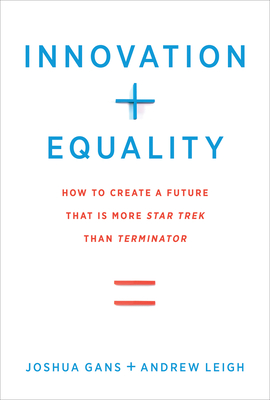

 MIT Press
MIT Press
Innovation + Equality: How to Create a Future That Is More Star Trek Than Terminator


Key Metrics
- Joshua Gans
- MIT Press
- Hardcover
- 9780262043229
- 9.1 X 6.1 X 0.9 inches
- 0.95 pounds
- Political Science > Public Policy - Economic Policy
- English
 Secure Transaction
Secure TransactionBook Description
Is economic inequality the price we pay for innovation? The amazing technological advances of the last two decades--in such areas as artificial intelligence, genetics, and materials--have benefited society collectively and rewarded innovators handsomely: we get cool smartphones and technology moguls become billionaires. This contributes to a growing wealth gap; in the United States; the wealth controlled by the top 0.1 percent of households equals that of the bottom ninety percent. Is this the inevitable cost of an innovation-driven economy? Economist Joshua Gans and policy maker Andrew Leigh make the case that pursuing innovation does not mean giving up on equality--precisely the opposite. In this book, they outline ways that society can become both more entrepreneurial and more egalitarian.
All innovation entails uncertainty; there's no way to predict which new technologies will catch on. Therefore, Gans and Leigh argue, rather than betting on the future of particular professions, we should consider policies that embrace uncertainty and protect people from unfavorable outcomes. To this end, they suggest policies that promote both innovation and equality. If we encourage innovation in the right way, our future can look more like the cheerful techno-utopia of Star Trek than the dark techno-dystopia of The Terminator.
Author Bio
Joshua Gans is a Professor of Strategic Management and holder of the Jeffrey S. Skoll Chair of Technical Innovation and Entrepreneurship at the Rotman School of Management, University of Toronto (with a cross appointment in the Department of Economics). Joshua is also Chief Economist of the University of Toronto's Creative Destruction Lab. Prior to 2011, he was the foundation Professor of Management (Information Economics) at the Melbourne Business School, University of Melbourne and prior to that he was at the School of Economics, University of New South Wales. In 2011, Joshua was a visiting researcher at Microsoft Research (New England). Joshua holds a Ph.D. from Stanford University and an honors degree in economics from the University of Queensland. In 2012, Joshua was appointed as a Research Associate of the NBER in the Productivity, Innovation and Entrepreneurship Program.
At Rotman, he teaches MBA students entrepreneurial strategy. He has also co-authored (with Stephen King and Robin Stonecash) the Australasian edition of Greg Mankiw's Principles of Economics (published by Cengage), Core Economics for Managers (Cengage), Finishing the Job (MUP), Parentonomics (New South/MIT Press) and Information Wants to be Shared (Harvard Business Review Press) and The Disruption Dilemma (MIT Press, 2016); Scholarly Publishing and its Discontents (2017), Prediction Machines: The Simple Economics of Artificial Intelligence (HBR Press, 2018) and Innovation + Equality (MIT Press, 2019). His most recent book is The Pandemic Information Gap: The Brutal Economics of Covid-19 (MIT Press, 2020)
While Joshua's research interests are varied he has developed specialities in the nature of technological competition and innovation, economic growth, publishing economics, industrial organisation and regulatory economics. This has culminated in publications in the American Economic Review, Journal of Political Economy, RAND Journal of Economics, Journal of Economic Perspectives, Journal of Public Economics, and the Journal of Regulatory Economics. Joshua serves as the Department Editor (Business Strategy) of Management Science and an associate editor at the Journal of Industrial Economics and is on the editorial boards of the BE Journals of Economic Analysis and Policy, Economic Analysis and Policy, Games and the Review of Network Economics. In 2007, Joshua was awarded the Economic Society of Australia’s Young Economist Award. In 2008, Joshua was elected as a Fellow of the Academy of Social Sciences, Australia. Details of his research activities can be found here. In 2011, Joshua (along with Fiona Murray of MIT) received a grant for almost $1 million from the Sloan Foundation to explore the Economics of Knowledge Contribution and Distribution. In 2017, Joshua won the Roger Martin Award for Research Excellence at the Rotman School of Management. In 2019, Joshua was awarded the PURC Distinguished Service Award from the Public Utility Research Center at the University of Florida for his contributions to regulatory economics.
On the consulting side, Joshua is managing director of Core Economic Research and an Academic Associate with The Brattle Group. In the past, Joshua has worked with several established consulting firms including London Economics, Frontier Economics and Charles River Associates. He has also been retained by the Australian Competition and Consumer Commission and the Federal Trade Commission where he worked on expert testimony in several abuse of market power cases as well as on issues in telecommunications network competition. Overall his consulting experience covers energy (gas and electricity markets), telecommunications, financial services and banking, pharmaceuticals and rail transport.
Source: joshuagans.com
Videos






Community reviews
Write a ReviewNo Community reviews